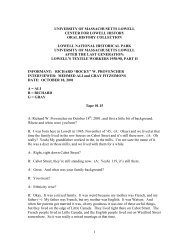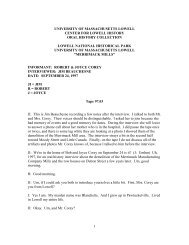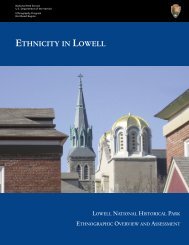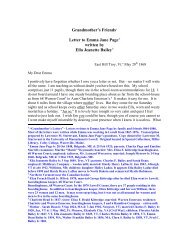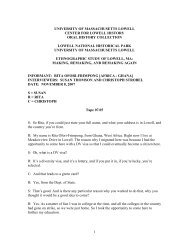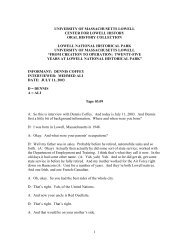LOOM AND SPINDLE OR Life Among the Early Mill Girls WITH A ...
LOOM AND SPINDLE OR Life Among the Early Mill Girls WITH A ...
LOOM AND SPINDLE OR Life Among the Early Mill Girls WITH A ...
Create successful ePaper yourself
Turn your PDF publications into a flip-book with our unique Google optimized e-Paper software.
CHAPTER II.<br />
CHILD-LIFE IN THE LOWELL COTTON-MILLS.<br />
In attempting to describe <strong>the</strong> life and times of <strong>the</strong> early mill-girls, it has seemed best for<br />
me to write my story in <strong>the</strong> first person; not so much because my own experience is of<br />
importance, as that it is, in some respects, typical of that of many o<strong>the</strong>rs who lived and<br />
worked with me.<br />
Our home was in Boston, in Leverett Court, now Cotting Street, where I was born <strong>the</strong><br />
year <strong>the</strong> corner-stone was laid for <strong>the</strong> Bunker Hill Monument, as my mo<strong>the</strong>r told me<br />
always to remember. We lived <strong>the</strong>re until I was nearly seven years of age, and, although<br />
so young, I can remember very vividly scenes and incidents which took place at that<br />
time. We lived under <strong>the</strong> shadow of <strong>the</strong> old jail (near where Wall Street now runs), and<br />
we children used to hear conversations not meant for small ears, between <strong>the</strong> prisoners<br />
and <strong>the</strong> persons in <strong>the</strong> court who came <strong>the</strong>re to see <strong>the</strong>m.<br />
All <strong>the</strong> land on which <strong>the</strong> North Union Station now stands, with <strong>the</strong> railway lines<br />
connected with it, and also <strong>the</strong> site of many of <strong>the</strong> streets, particularly Lowell Street, was<br />
<strong>the</strong>n a part of <strong>the</strong> <strong>Mill</strong>-pond, or was reclaimed from <strong>the</strong> Bay. The tide came in at <strong>the</strong> foot<br />
of Leverett Court, and we could look across <strong>the</strong> water and see <strong>the</strong> sailing vessels coming<br />
and going. There <strong>the</strong> down-east wood-coasters landed <strong>the</strong>ir freight; many a time I have<br />
gone "chipping" <strong>the</strong>re, and once a generous young skipper offered me a stick of wood,<br />
which I did not dare to take.<br />
In 1831, under <strong>the</strong> shadowy of a great sorrow, which had made her four children<br />
fa<strong>the</strong>rless,– <strong>the</strong> oldest but seven years of age,–my mo<strong>the</strong>r was left to struggle alone; and,<br />
although she tried hard to earn bread enough to fill our hungry mouths, she could not do<br />
it, even with <strong>the</strong> help of hind friends. And so it happened that one of her more wealthy<br />
neighbors, who had looked with longing eyes on <strong>the</strong> one little daughter of <strong>the</strong> family,<br />
offered to adopt me. But my mo<strong>the</strong>r, who had had a hard experience in her youth in<br />
living amongst strangers, said, "No; while I have one meal of victuals a day, I will not<br />
part with my children." I always remembered this speech because of <strong>the</strong> word "victuals,"<br />
and I wondered for a long time what this good old Bible word meant.<br />
My fa<strong>the</strong>r was a carpenter, and some of his fellow-workmen helped my mo<strong>the</strong>r to open a<br />
little shop, where she sold small stores, candy, kindling-wood, and so on, but <strong>the</strong>re was<br />
no great income from this, and we soon became poorer than ever. Dear me! I can see <strong>the</strong><br />
small shop now, with its jars of striped candy, its loaves of bread, <strong>the</strong> room at <strong>the</strong> back,<br />
where we all lived, and my oldest bro<strong>the</strong>r (now a "D.D.") sawing <strong>the</strong> kindling-wood<br />
which we sold to <strong>the</strong> neighbors.<br />
That was a hard, cold winter; and for warmth's sake my mo<strong>the</strong>r and her four children all<br />
slept in one bed, two at <strong>the</strong> foot and three at <strong>the</strong> head,–but her richer neighbor could not<br />
get <strong>the</strong> little daughter; and, contrary to all <strong>the</strong> modern notions about hygiene, we were a



